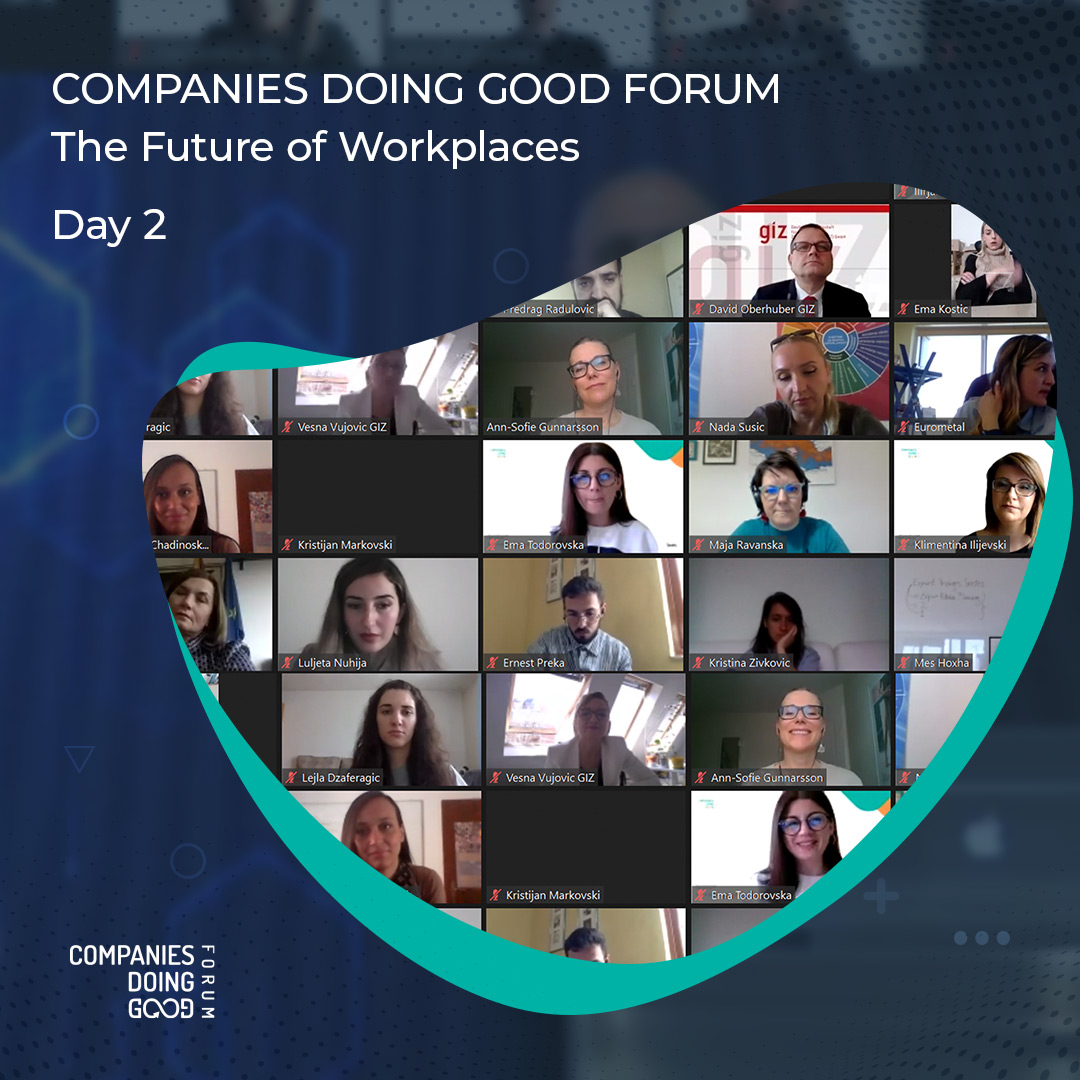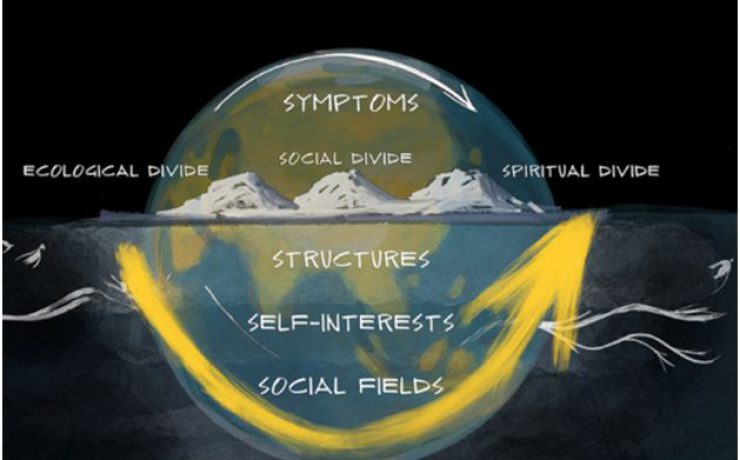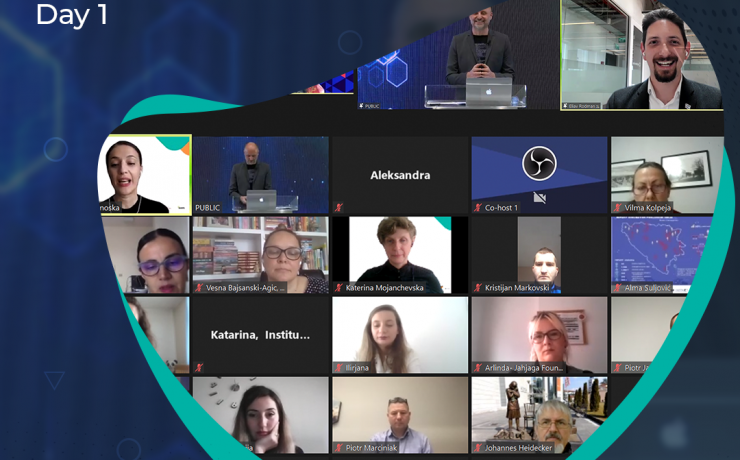Individual approach, innovation and listening to the needs – open doors towards successful integration

The Companies Doing Good Forum 2021 has established a holistic view of the possible transformational change of the intersection – business / institutions / civil society, by including these stakeholders in the process of co-creating and encouraging joint actions.
Bringing a vision for the future of jobs, in which people, their values and personality will be the focal point, the second day of the Forum brought the experiences and views of professionals from Sweden, Austria, Belgium, Bosnia and Herzegovina and North Macedonia.
The discussions were opened by the Minister of Labor and Social Policy in North Macedonia, Jagoda Shahpaska, who, among other things, shared that the decentralization of social services is an important segment in the social policy. – We need local networks for social services that are created according to the needs of the citizens of each municipality. Decentralization enables and encourages protection and employment. It envisages multilateral partnerships between the private, public and civil society sectors, which jointly deal with important social issues.
David Oberhuber, Country Director for Northern Macedonia and Kosovo, from Deutsche Gesellschaft für
Internationale Zusammenarbeit (GIZ) GmbH shared that by supporting the Forum, GIZ promotes the opportunities and values of the upcoming new economic and business models by presenting examples of inclusive and social businesses and a social mentoring approach that can simultaneously lead to social, economic and environmental growth, as well as reduce the inequalities in the society.
Klimentina Ilijevski, Executive Director of Public, shared that social enterprises promote new ways of doing business by relying on local resources and supporting the creation of new jobs.
– Social enterprises contribute to the fight against poverty, promote fair working conditions, improve social protection through the delivery of public services in health care and education, they make pioneering steps towards the development of social innovation by addressing socio-economic challenges and responding to them. They also contribute to the circular economy and develop solutions that are environmentally friendly, encourage responsible consumerism, and create new and quality jobs adapted to new technologies and digitalization. They are entities that live and promote sustainable development.
How does Ikea make a social impact by creating jobs for the vulnerable?
Ann-Sophie Gunnarsson, New Partnership and Collaboration Manager from Ikea, Sweden shared that through social business partnerships, Ikea has created 30.000 jobs as well as 300 different products globally.
– We want to try new things and break social barriers. We include women from vulnerable categories, refugees and other vulnerable people. We ask them what they know best to do, and then we see what products can be made according to their capacities. The inclusion and integration of these people is very important in the long run, because they create stable jobs and move the economy forward – she shared on the Forum.
This initiative of “Ikea” was started 9 years ago. – We use our strength – our expertise in product development, and then we create collaborations with social businesses that can be integrated in the production process. As a major market player, we can provide everything that social businesses need and we always see how we can meet their needs. The key is cooperation. Many of our suppliers approach us and want to get involved in making a positive change. They see the mutual benefit and together we learn from each other on how best to create social businesses – she said.
Gunnarson also emphasized that in this cooperation, they maintain continuity, plan long-term and invest in sustainable jobs.
– Inclusion is more important than ever. Our goal is to provide 95 000 jobs by 2030. We will achieve that through the integration of these people, and the added value is that the products that they will make are handicrafts, i.e. unique.
Social services must emerge from local challenges
Within the discussion Social enterprise community models- development of social services in accordance with the needs of local communities, the panel session brought examples of the role of social services, the need for innovation in this field, but also the need for local initiatives, created according to the needs of specific municipalities. Speakers of this session were Michael Samec, team leader in GIZ, the Deputy Head of the Social Protection Sector in the Ministry of Labor and Social Policy, Sofija Spasovska, and the Mayor of Demir Kapija, Lazar Petrov. The conversation was moderated by Klimentina Ilijevski from “Public”, who pointed out that services can be offered through social entrepreneurship. Samec pointed out that the most appropriate starting point is the local level, because the citizens themselves are closest to the problems they face and can best present them:
– Of course, it is necessary to think about a personalized solution for each municipality. Therefore, it is most practical to work with social businesses and the civil society sector. One of the main problems is the exclusion of the vulnerable groups from the labor market, but of course there are many others. When each municipality conducts its own mapping, it will know exactly what services are needed to solve a particular problem and for what matters an initiative should be launched. This is all a learning process. What is certain is that the cooperation between the different sectors is extremely important and necessary for the future, so that we can develop sustainable services, finances and jobs – said Samec. Spasovska pointed out that the MLSP, with the support of GIZ has already implemented a project through which the needs for social services were mapped in several municipalities.
– We did not experience this only as a project, but we developed real cooperation so that we can find out what is needed in the municipalities and how to improve the social protection system. When asked what happens if an innovative social service appears, which the system does not recognize, Spasovska clarified that mechanisms have been established to enable functionality. – The current social protection system is open. Innovative social services are part of the law, and this system is a dynamic process.
Petrov said that Demir Kapija was among the first municipalities to map the problems and it has implemented a strategy for creating social services.
– The mapping was done with the providers and the civil sector, and as a relatively small municipality, it is easier to see the problems of the people. We are one of the first supporters of the development of deinstitutionalization. We have built several housing units for people with disabilities and started a project to help the home for the elderly and infirm. In the future, we would like to open more such housing units, as well as jobs, because that creates a win-win situation. On the one hand, people are employed, and on the other hand, people from the vulnerable groups are enabled to live better and be included in the community like all other fellow citizens – shared Petrov.
Job carving and job crafting for a more inclusive labor market
Annette Skopeta, Deputy Director, European Center for Social Welfare, Austria, presented social labor market innovations to promote social inclusion.
– Through job carving and job crafting, we want to achieve harmony between the skills and the abilities of the people from the vulnerable groups and the job positions in the companies, in a manner that the companies themselves need to adjust the jobs according to this staff and thus include them in the market. The implementation of these solutions is not so simple because there is a gap between the supply – the groups we want to include in the labor market and the demand – the companies that have certain expectations or disbelief in the process – said Skopeta.
She also shared that with the pandemic, the vulnerable groups took the hardest blow, so we have to look at things closely in order to mitigate the consequences. -The system and the different parties do not communicate effectively and their interaction does not work properly. It is therefore necessary to strengthen this connection. It is complex, but we are far ahead of what we were a few years ago. Social innovation entails the new practices and it is a new approach that brings better outcomes because the society itself decides whether an innovation is good or not – said Skopeta.
Social mentoring – bridge between job creation and social inclusion programs
The second day also brought a presentation of the innovation social mentoring, through which the vulnerable citizens are supported and individually directed to the labor market. Inputs from the first generation of 10 social mentors from North Macedonia, Serbia, Bosnia and Herzegovina, Kosovo and Albania were shared, who described the training process as a major change in the way they work with vulnerable people. – We need changes in all parts of the system in order to to see a real change. We learned a lot through social mentoring – said Jelena Stankovic, one of the 10 social mentors who have recently been trained to provide this service. -We are agents of change and we develop the skills that the people we mentor need because they deserve it – said social mentor Arlinda Zaimi.
– I strongly believe that a social mentoring approach will be a way to build a bridge between the employment and social inclusion programs, as well as between the employment agencies and the social work centers – said Samec from GIZ.
The second panel discussion brought a discussion about mentoring as a process in work integration. Denis Skiljak, Manager of SOS Children’s Village, Bosnia and Herzegovina, Irena Jakimovska, Manager and Co-owner of “Comfy Angel” and President of the Regional Chamber of Commerce in Prilep participated. The discussion was moderated by Nebojsa Ilijevski, Content Director of the Forum. Shiljak shared that SOS Children’s Village from BiH works with young people and children without parents or who are at risk of being left without a parent or caregiver, training them with the necessary skills to be part of the labor market. -We include individual sessions for life skills, employment skills, mentoring, etc. Then we find them practice and job shadowing so they can put into practice what they have learned. There is a weak labor market in Bosnia, and a strong gray economy, so even 45% of young people find work on the gray market, are exposed to risks, and do not have the necessary experience to find a normal job. We are trying to find solutions step by step, but it is difficult because there is no legal framework in the country to organize these activities. One of the biggest challenges is keeping the job for a long time, which is much more pronounced now with the COVID – said Shiljak. Jakimovska pointed out that “Comfy Angel” has 1000 employees. -Maybe I cannot have an impact on a global scale, but I can influence locally on the structure and the way of working in our company. I can proudly say that we are building a social company and that we take care of those who do not have equal opportunities as everyone else. Everything has its own evolutionary process, and so does this. Socially responsible companies are highly valued and the community recognizes them well, so I think other businesses will join. “Companies that work purely for profit are, in my opinion, the poorest companies,” she said. The Forum was also attended by the consultants Wim Van Amel and Bie Bijnens from I Diverso, an innovative company that offers services for integration of the vulnerable groups in the labor market by working with the vulnerable, but also with the companies. The guests from Belgium pointed out that in addition to investing in strengthening the competencies of vulnerable people and supporting them in their path to employment, the approach to the businesses is also important so as to identify their needs in terms of lack of certain jobs.
– We worked a lot with the companies on job coaching, job carving, positions design, etc. Throughout this process, there was nothing predetermined, but we listened to their needs. Inclusive entrepreneurship is also important because of the branding it brings to companies, but to us it was important because we turned our attention from the vulnerable to the businesses that have become our customers. Only in this way can we create change and chances for these vulnerable groups to find their place in the labor market- Bijnens said. Van Amel suggested that it is especially important to communicate success stories: – We learned that the design of job positions is not something you do first and instead first we do coaching and then we establish a connection with the companies and their needs. Only then comes the design of the positions.



